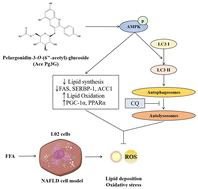Acetylated pelargonidin-3-O-glucoside alleviates hepatocyte lipid deposition through activating the AMPK-mediated lysosome-autophagy pathway and redox state†
Abstract
Nonalcoholic fatty liver disease (NAFLD) is a worldwide public health issue, but a widely accepted therapy is still lacking until now. Anthocyanins are natural flavonoid compounds that possess various bioactivities, but their applications are limited due to their low bioavailability and stability. Acylated anthocyanins are reported to show higher stability, whereas their effects on NAFLD are still unclear. Herein, pelargonidin-3-O-(6′′-acetyl)-glucoside (Ace Pg3G) was found to dose-dependently reduce intracellular lipid droplets and triglycerides, and improve cellular oxidative stress that accompanied lipid deposition. Besides, Ace Pg3G was proved to activate AMPK phosphorylation, thus stimulating AMPK-mediated lysosome-autophagy pathway to eliminate overloaded lipid. Further study unveiled that Ace Pg3G regulated genes related to lipid metabolism downstream of AMPK to inhibit lipid synthesis and accelerate lipid oxidation. Overall, this study provided the first evidence, to our best knowledge, that Ace Pg3G ameliorated free fatty acid-induced lipid deposition in hepatocytes through regulating AMPK-mediated autophagy pathways and redox state.



 Please wait while we load your content...
Please wait while we load your content...